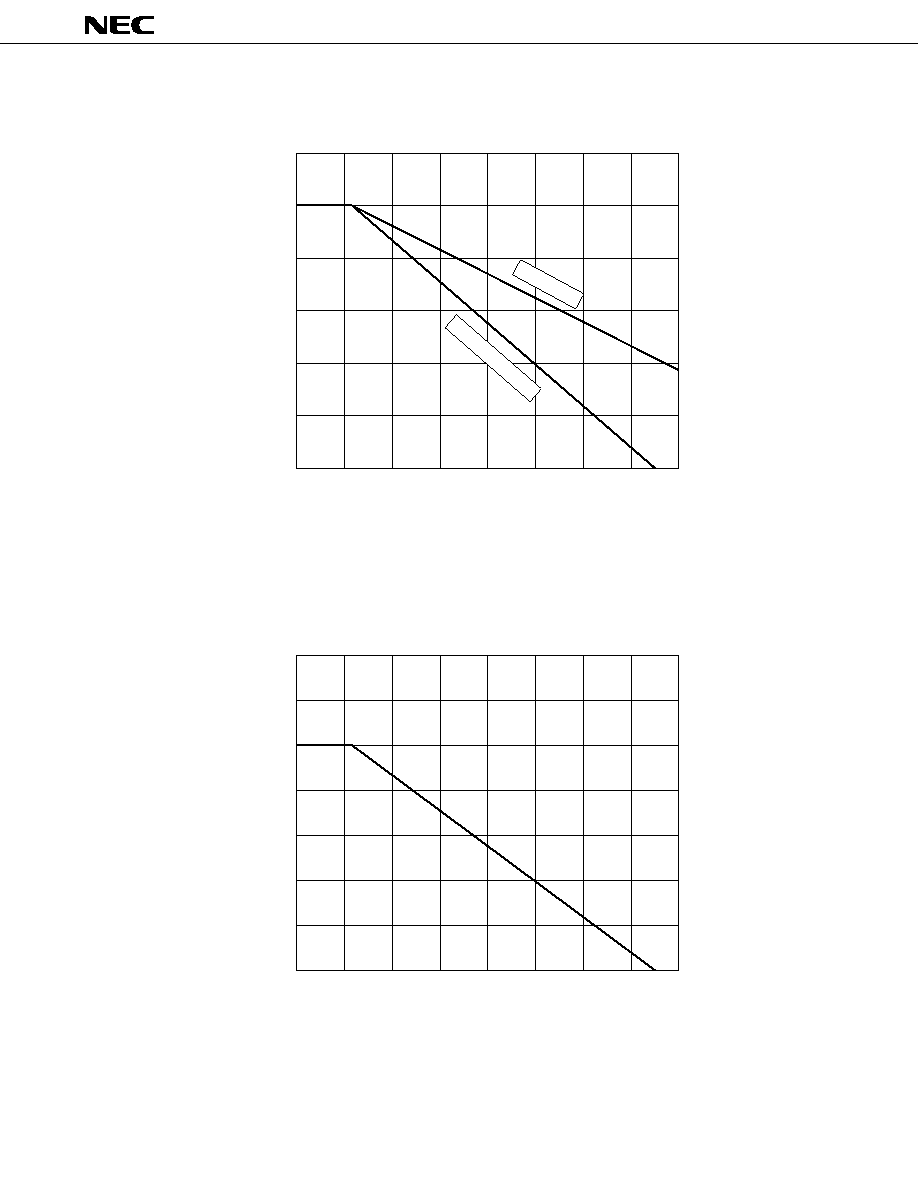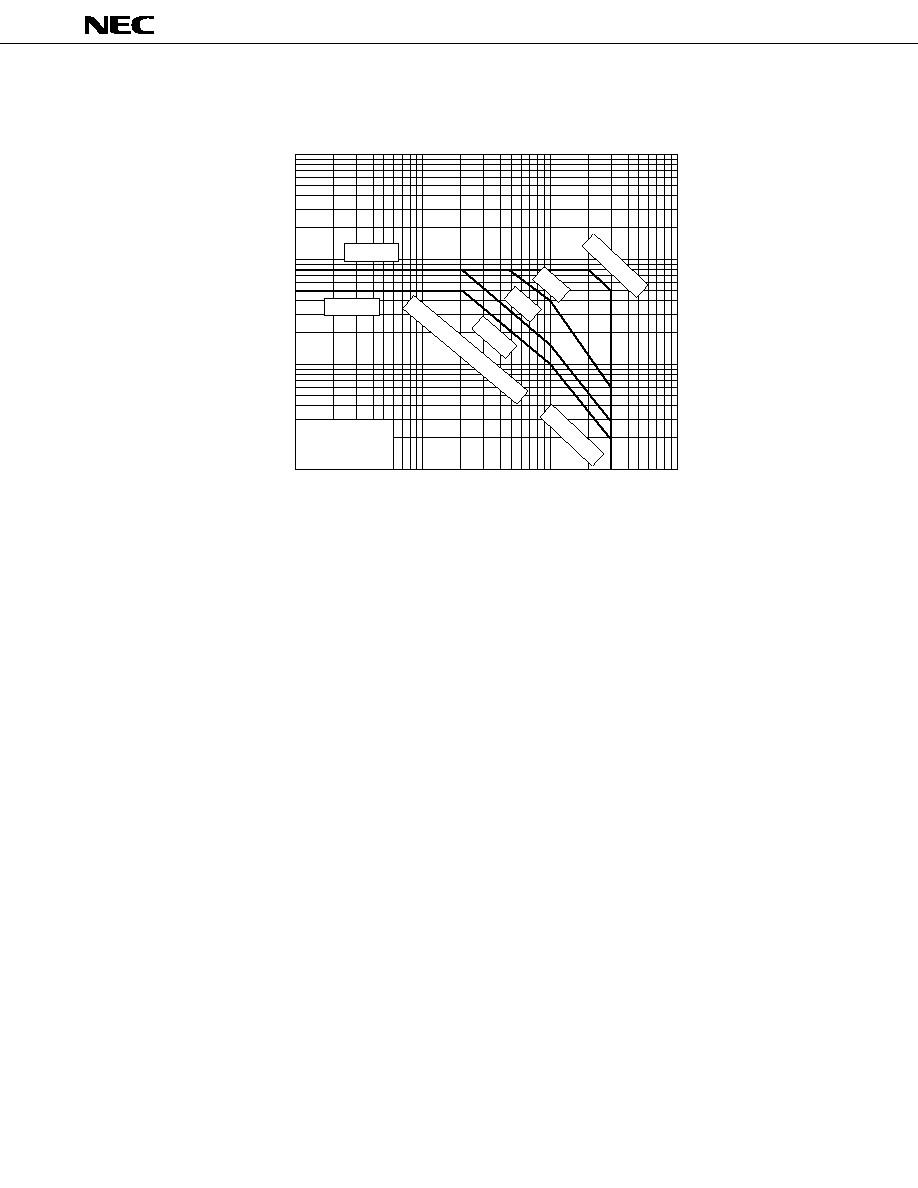
characteristics
SYMBOL
TEST CONDITIONS
MIN.
TYP.
MAX.
UNIT
Collector Cutoff Currnet
I
CB0
V
CB
=
-
30 V, I
E
= 0
-
100
nA
Emitter Cutoff Current
I
EB0
V
EB
=
-
6.0 V, I
C
= 0
-
100
nA
DC Current Gain
h
FE1
V
CE
=
-
2.0 V, I
C
=
-
0.5 A
150
600
-
DC Current Gain
h
FE2
V
CE
=
-
2.0 V, I
C
=
-
3.0 A
70
-
Collector Saturation Voltage
V
CE(sat)1
I
C
=
-
0.5 A, I
B
=
-
25 mA
-
0.08
-
0.15
V
Collector Saturation Voltage
V
CE(sat)2
I
C
=
-
1.0 A, I
B
=
-
50 mA
-
0.13
-
0.25
V
Collector Saturation Voltage
V
CE(sat)3
I
C
=
-
2.0 A, I
B
=
-
100 mA
-
0.24
-
0.40
V
Collector Saturation Voltage
V
CE(sat)4
I
C
=
-
3.0 V, I
B
=
-
75 mA
-
0.46
-
1.0
V
Base Saturation Voltage
V
BE(sat)
I
C
=
-
1.0 A, I
B
=
-
50 mA
-
0.83
-
1.50
V
Gain Bandwidth Product
f
T
V
CE
=
-
10 V, I
E
=
-
50 mA
75
MHz
Output Capacitance
C
ob
V
CB
=
-
10 V, I
E
= 0, f = 1 MHz
60
pF
�
1996
DATA SHEET
The information in this document is subject to change without notice.
SILICON TRANSISTOR
2SB1657
FEATURES
�
Low V
CE(sat)
V
CE(sat)
=
-
0.15 V Max (@l
C
/l
B
= 0.5 A/25 mA)
�
High DC Current Gain
h
FE
= 150 to 600 (@V
CE
=
-
2.0 V, l
C
=
-
0.5 A)
ABSOLUTE MAXIMUM RATINGS
Maximum Voltage and Current (T
A
= 25
�
C)
Collector to Base Voltage
V
CB0
-
30 V
Collector to Emitter Volteage
V
CE0
-
30 V
Emitter to Base Voltage
V
EB0
-
6.0 V
Collector Current (DC)
I
C(DC)
-
5.0 A
Collector Current (Pulse)*
I
C(Pulse)
-
8.0 A
Base Current (DC)
I
B(DC)
-
1.0 A
* PW
10ms, Duty Cycle
10 %
Maximum Power Dissipation
Total Power Dissipation (T
C
= 25
�
C)
P
T
10 W
Total Power Dissipation (T
A
= 25
�
C)
P
T
1.0 W
Maximum Temperature
Junction Temperature
T
j
150
�
C
Storage Temperature
T
stg
-
55 to 150
�
C
ELECTRICAL CHARACTERISTICS (T
A
= 25
�
C)
Document No. D10627EJ1V0DS00 (1st edition)
Date Published June 1996 P
Printed in Japan
AUDIO FREQUENCY AMPLIFIER, SWITCHING
PNP SILICON EPITAXIAL TRANSISTORS
PACKAGE DIMENSIONS
in millimeters (inches)
8.5 MAX.
(0.334 MAX.)
1.2
(0.047)
1.2
(0.047)
0.8
(0.031)
2.3
(0.090)
1.
2.
3.
Emitter
Collector connected to mounting plane
Base
2.3
(0.090)
+0.08
-
0.05
0.55
(0.021)
+0.08
-
0.05
1 2 3
12.0 MAX.
(0.472 MAX.)
3.8 � 0.2 (0.149)
3.2 � 0.2
( 0.126)
2.5 � 0.2 (0.098)
13.0 MIN.
(0.512 MIN.)
2.8 MAX.
(0.110 MAX.)
3.2 � 0.2 ( 0.126)

2
2SB1657
T
C
-Case Temperature -
�
C
DERATING FACTOR OF FORWARD BIAS SAFE OPERATING AREA
dT - Percentage of Rated Power - %
160
140
120
100
80
60
40
20
0
20
40
60
80
100
T
C
-Case Temperature -
�
C
TOTAL POWER DISSIPATION vs. CASE TEMPERATURE
P
T
- Total Power Dissipation - W
160
140
120
100
80
60
40
20
0
2
4
6
8
10
12
14
S/b Limited
Dissipation Limited

3
2SB1657
V
CE
- Collector to Emitter Voltage - V
FORWARD BIAS SAFE OPERATING AREA
I
C
- Collector Current - A
-
100
-
10
-
1
-
0.1
-
0.1
-
1
-
10
-
100
T
C
= 25
�
C
Single Pulse
S/b Limited
Power Dissipation Limited
I
C(pulse)
I
C(DC)
PW = 0.1 ms
1 ms
10 ms
100 ms

4
2SB1657
V
CE
- Collector to Emitter Voltage - V
COLLECTOR TO EMITTER VOLTAGE vs COLLECTOR CURRENT
I
C
-Collector Current-A
-
6
-
5
-
4
-
3
-
2
-
1
0
-
4.0
-
3.0
-
2.0
-
1.0
-
16 mA
-
12 mA
-
8mA
I
B
=
-
4 mA
DC CURRENT GAIN vs COLLECTOR CURRENT
I
C
- Collector Current - A
h
FE
- DC Current Gain
-
1
-
10
-
100 m
-
10 m
-
1 m
10
100
1000
V
C E
=
-
2 V

5
2SB1657
I
C
- Collector Current - A
COLLECTOR SATURATION VOLTAGE vs COLLECTOR CURRENT
V
CE(sat)
- Collector Saturation Voltage - V
-
10
-
1
-
0.1
-
0.01
-
0.01
-
0.1
-
1
-
10
I
C
/I
B
= 20
I
C
- Collector Current - A
BASE SATURATION VOLTAGE vs COLLECTOR CURRENT
V
BE(sat)
- Base Saturation Voltage - V
-
10
-
1
-
0.1
-
0.01
-
0.01
-
0.1
-
1
-
10
I
C
/I
B
= 20

6
2SB1657
V
CB
- Collector to Base Voltage - V
OUTPUT CAPACITANCE vs COLLECTOR TO BASE VOLTAGE
Cob - Output Capacitance - pF
-
100
-
10
-
1
-
0.1
1
10
100
1000

7
2SB1657
REFERENCE
Document Name
Document No.
NEC semiconductor device reliability/quality control system
TEI-1202
Quality grade on NEC semiconductor devices
IEI-1209
Semiconductor device mounting technology manual
C10535E
Semiconductor device package manual
C10943X
Guide to quality assurance for semiconductor devices
MEI-1202
Semiconductor selection guide
X10679E

8
2SB1657
No part of this document may be copied or reproduced in any form or by any means without the prior written
consent of NEC Corporation. NEC Corporation assumes no responsibility for any errors which may appear in
this document.
NEC Corporation does not assume any liability for infringement of patents, copyrights or other intellectual property
rights of third parties by or arising from use of a device described herein or any other liability arising from use
of such device. No license, either express, implied or otherwise, is granted under any patents, copyrights or other
intellectual property rights of NEC Corporation or others.
While NEC Corporation has been making continuous effort to enhance the reliability of its semiconductor devices,
the possibility of defects cannot be eliminated entirely. To minimize risks of damage or injury to persons or
property arising from a defect in an NEC semiconductor device, customers must incorporate sufficient safety
measures in its design, such as redundancy, fire-containment, and anti-failure features.
NEC devices are classified into the following three quality grades:
"Standard", "Special", and "Specific". The Specific quality grade applies only to devices developed based on a
customer designated "quality assurance program" for a specific application. The recommended applications of
a device depend on its quality grade, as indicated below. Customers must check the quality grade of each device
before using it in a particular application.
Standard: Computers, office equipment, communications equipment, test and measurement equipment,
audio and visual equipment, home electronic appliances, machine tools, personal electronic
equipment and industrial robots
Special:
Transportation equipment (automobiles, trains, ships, etc.), traffic control systems, anti-disaster
systems, anti-crime systems, safety equipment and medical equipment (not specifically designed
for life support)
Specific:
Aircrafts, aerospace equipment, submersible repeaters, nuclear reactor control systems, life
support systems or medical equipment for life support, etc.
The quality grade of NEC devices is "Standard" unless otherwise specified in NEC's Data Sheets or Data Books.
If customers intend to use NEC devices for applications other than those specified for Standard quality grade,
they should contact an NEC sales representative in advance.
Anti-radioactive design is not implemented in this product.
M4 96.5







